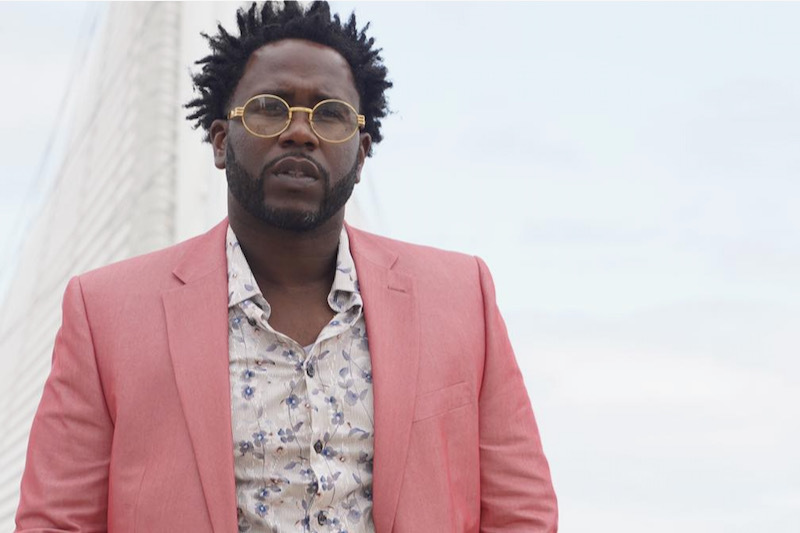Bill Scholl was introduced to Marquette University family, and Milwaukee, back in September when he was hired to replace interim athletic director Bill Cords in a full-time capacity. The university had been searching for one since Larry Williams had departed in December 2013.
Scholl, who came to Milwaukee by way of Ball State University in Muncie, Ind. (after spending over two decades at the University of Notre Dame), didn’t officially begin his duties at the Jesuit institution until late October, however.
Now with the basketball seasons in full effect and the Big East conference season right around the corner for the men’s and women’s basketball programs, OnMilwaukee.com caught up with Scholl in his office at the Al McGuire Center to talk about the unionization of college athletes and how that could affect Marquette, the fact he doesn’t have football to worry about for the first time in decades, where Marquette stands on the new arena issue and how Milwaukee has treated him.
OnMilwaukee.com: You’re obviously familiar with the Midwest, but it seems like Milwaukee always surprises its newest residents. What have your impressions been about your new hometown?
Bill Scholl: It’s been tremendous. It’s funny you say surprised. I think it would have surprised us except everybody we talked to, once they heard I was taking this position, if they had experience in Milwaukee they were telling us – we have very close friends that have moved all around the country – and said the absolute favorite city they lived in was Milwaukee. One of the people that I worked with at Ball State was a former Marquette student athlete. I was surrounded by a lot of folks. We had just recently hired an intern from Marquette.
So, there were so many people around us that had experience in Milwaukee and I, oddly, did not. Of all the different places I’ve spent time, Milwaukee wasn’t one of them. not that I had never been here, but I had not spent a lot of time here. And I just heard from so many people what a great city this would be and how much we would enjoy living here, and two months in I would certainly concur. My wife and I are here without children – our kids are older – so it’s just the two of us, so we have had the chance to kind of get out to dinner and it’s a very vibrant town.
OMC: When you got here, was is strange to start work without the worry of football for the first time. I assume that took a huge amount of time out of your day-to-day duties, so did it seem strange at all for you that it wasn’t on your plate?
BS: I don’t think this fall it felt that strange because I stayed at Ball State and was part of that football program almost up until Oct. 20, so through homecoming at Ball State, six or seven home games, so I feel like I had a football season. I think when I might notice it is next August, when Aug. 1 rolls around and all these big guys aren’t showing up to go to fall camp and there’s no marching band out there practicing getting ready for the fall. I think that’s when I’ll notice it. It is – you assume that’s where I spent a lot of time – that’s so true.
When you have football, it takes up an immense amount of time. People have said ‘Will you miss it?’ I’m sure I will. But obviously, in any new position, new situation, you weigh the pro’s and con’s and it wasn’t even close enough to cause me to have second thoughts about me accepting this position.
OMC: Is it exciting to be a part of a basketball-driven conference like the Big East, knowing you don’t have to worry about how football is affecting the entire athletic department?
BS: I think every school has to develop it’s own identity, whether it’s the power five playing football at that level or the group of five playing at a MAC level or it’s the basketball driven programs that are focused on basketball. I think you have to embrace what you are you. One of the neat things, I think, about a place like Marquette is we really are focused on who we are and what’s important to us. And in some ways, it does make the job – I don’t know if "easier" is the right word – but the direction is very clear. And everybody involved in the enterprise understands what the priorities are. It’s a very manageable menu of sports (14 men’s and women’s teams) and one that I think Marquette can compete at the highest level across the board.
OMC: In March, the National Labor Relations Board ruled that student-athletes at Northwestern University in Evanston, Ill. – a private university like Marquette – could unionize. While the public debate rages on and actions take place in court rooms, how closely do you have to watch that process?
BS: We have to pay attention to it a whole lot. And while a lot of the focus appears to be on football, certainly basketball is in that mix. And, as lawsuits get filed, the Big East and Big East member schools are being named. So, it very much, all of that, very much impacts all of the Division I schools, regardless of what sports you play. So it is something we’ve got to pay a lot of attention to. The question I get is where it is all going? I wish I was that smart and I’m not sure I am — I know I’m not. I don’t know what’s next in our collegiate landscape. I really don’t. I would say that we’ll find a way to get through it, like we always do, and hopefully we’ll come out of it better in the end than we are right now.
What bothers me in all of this is I think 99.99 percent of the schools, the student-athletes, the administrators, are all trying to do the right things. Virtually everybody in this business is in it to help student-athletes. Unfortunately, the occasional negative story that comes along tends to get a lot of attention, and I understand why that is. That is kind of the nature of the beast. But, there are so many great stories and so many student-athletes that are utilizing their athletic capabilities to get college educations, and in the end, I think that’s what it ought to be about. And I think for the most part, it is.
OMC: Could the fact that Marquette does not have a football team to support – and only have 14 total sports – prevent the university from being crippled if student-athletes are allowed to unionize and be awarded money?
BS: I think you’re exactly right. I think it is certainly easier to deal with some of these issues when you have fewer numbers of athletes. Football is 85 scholarships. So right off the top, you do the cost of attendance for 85 scholarships, it’s a significant number and obviously one that Marquette won’t have to deal with. In terms of being crippled, I’m an optimist, so I feel like as I said earlier – I feel like we’ll all come through this with some good order and some good direction. But I say that not knowing all that’s coming at us, to be honest with you.
Could it be crippling? I guess it could be. I don’t think that’s what will happen. It’s just so hard right now I think to see into the future. There are so many things in play right now it’s really hard to know where we’re going to be in 10 years. I did see (NCAA president) Mark Emmert talked about the next 36 to 48 months being an absolutely seminal period for intercollegiate athletics, and I think he’s right.
As the autonomy issue beings to unfold and we see how everybody else reacts to it, and we see how the power five kind of handle the autonomy issue, it could go a lot of different directions the next couple years. I just think there are a lot of smart people engaged in this and I hope in the end it works out in a way that is good for our student-athletes.
OMC: Speaking of having different things on your plate here, one such "thing" is what is happening where the men’s basketball team plays it games with the new arena conversation. Is the university just an interested observer at this point, or actively engaged?
BS: I would say we’re more than an interested observer, and I would also say that the ownership of the Bucks and the senior leadership of the Bucks have been very inclusive with us. So, Marquette’s voice is definitely part of the process, and I think that’s very helpful. I haven’t spent a lot of time worrying about our current lease and what’s happened before because it’s just not really going to be a factor, assuming the new arena comes to be. It’s all new players involved, a new building, and new players on both sides of the equation, on the Marquette side and the Bucks’ side. What has been a learning experience for me, always having been at a place where the university controlled its facilities and really was the only game in town, I wasn’t sure the impact of a professional, an NBA team, versus the Marquette basketball team. It didn’t take long for me to figure out what’s good for one is probably good for both of us, and what’s good for both of us, I think, is good for Milwaukee. I really believe that.
I think one of the phenomenal aspects of (President) Dr. (James) Lovell’s leadership is his willingness to collaborate. He is not a lone ranger at all. He is all about "if we can do this much, if we get five other partners, we can do a whole lot more." And I love that approach to life, and that’s clearly the approach we’re taking relative to the Bucks and the new arena and truthfully, a whole lot of other things. I’m actually very excited about, for me, a new experience, but I think one that’s going to be an incredible opportunity for Marquette.
OMC: So it’s Marquette’s preference to continue to share a playing facility with the Bucks?
BS: Absolutely. I think if the Bucks were not here, I think it would be bad for basketball in this community. And if it’s bad for basketball, then it’s bad for Marquette basketball. So, we’re very excited about the opportunity to share an arena with the Bucks. And, let’s be honest, an NBA franchise can bring a state-of-the-art arena on board in a lot more effective way than a university can. It just would be very difficult for us to create that kind of facility if it was just us.
OMC: Back to some lighter fare to end here – you said you weren’t quite surprised by the city as maybe some other newcomers. So, what have you learned about Milwaukee or Wisconsin that maybe you didn’t know coming in?
BS: There are several things. Well, I shouldn’t say I didn’t know it having lived in the Midwest, I probably should’ve expected it, but the people are incredibly friendly. It has been such a welcoming community. Certainly the Marquette family has been, but even the Milwaukee community has been. That’s really been very cool for my wife and I. That’s really neat.
I knew the Packers were important; I’m a Cleveland guy initially and the "Dog Pound" takes great pride in being the "Dog Pound" as they should but man, I’m not sure I’ve seen anything quite as passionate as the Packers. I was leaving a couple of weeks ago on a Monday morning flight and one of the FAA guys, as I went through the line, I said something to him about how you doing this morning? and his answer was "Great, the Packers won yesterday." I’m not sure that happens everywhere.
So I love the Packers fanaticism. I think it’s really cool. I had the opportunity to go to a game, which was certainly on the bucket list. You can’t be in this business and not want to see a game at Lambeau Field, and I had that opportunity. It really kind of took me back to my college days because it has that kind of feel about it. You’re parking on grass, in the front yards of peoples homes, and then there’s those homes across the street where they're partying and walking to the game. It had, for an NFL game, very much a collegiate feel. So, I didn't know that would occur. So that was very cool. So, the surprises have all been very pleasant.
Jim Owczarski is an award-winning sports journalist and comes to Milwaukee by way of the Chicago Sun-Times Media Network.
A three-year Wisconsin resident who has considered Milwaukee a second home for the better part of seven years, he brings to the market experience covering nearly all major and college sports.
To this point in his career, he has been awarded six national Associated Press Sports Editors awards for investigative reporting, feature writing, breaking news and projects. He is also a four-time nominee for the prestigious Peter J. Lisagor Awards for Exemplary Journalism, presented by the Chicago Headline Club, and is a two-time winner for Best Sports Story. He has also won numerous other Illinois Press Association, Illinois Associated Press and Northern Illinois Newspaper Association awards.
Jim's career started in earnest as a North Central College (Naperville, Ill.) senior in 2002 when he received a Richter Fellowship to cover the Chicago White Sox in spring training. He was hired by the Naperville Sun in 2003 and moved on to the Aurora Beacon News in 2007 before joining OnMilwaukee.com.
In that time, he has covered the events, news and personalities that make up the PGA Tour, LPGA Tour, Major League Baseball, the National Football League, the National Hockey League, NCAA football, baseball and men's and women's basketball as well as boxing, mixed martial arts and various U.S. Olympic teams.
Golf aficionados who venture into Illinois have also read Jim in GOLF Chicago Magazine as well as the Chicago District Golfer and Illinois Golfer magazines.




.jpg)


